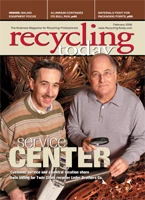
NEBRASKA CITY ROLLS OUT SINGLE-STREAM PROGRAM
The city of Omaha, Neb., has begun its single-stream curbside program.
First Star Fibers of Omaha will process and broker the material.
The move to single-stream collection has resulted in the elimination of glass from the curbside program, though drop-off locations are available. Acceptable materials include old newspapers, old corrugated containers, aluminum cans, tin cans, plastic and paper. According to Robert Sink, environmental services manager for Omaha, collectors and processors have the flexibility to add other materials.
Approximately 122,000 households participate in the curbside recycling program. Last year around 17,000 tons of recyclables were collected. Of that amount, Sink says that glass containers comprised nearly 1,500 tons.
Local press reports state that Omaha could save nearly $800,000 per year by moving from the source-separated collection program to single stream, with collection efficiency increasing.
SEATTLE BEGINS ENFORCEMENT
The city of Seattle has officially begun enforcing its recycling ordinance after months of broadcasting its intentions to residents and businesses.
Beginning in January, solid waste collectors will not pick up trash cans containing large amounts of recyclable paper, OCC, UBCs, glass, tin cans and plastic bottles and jars. Instead, collectors will leave a notice instructing the resident or business on where to take the recyclables before the trash can be collected.
Apartments, townhouses and condominiums that have garbage containers filled with more than 10 percent of recyclable paper, cardboard, aluminum and tin cans and glass and plastic bottles and jars will be tagged with warning notices by Seattle Public Utilities inspectors. After a third notice, a $50 charge will be added to the resident’s garbage account.
Recyclable paper, cardboard and yard debris are not allowed in commercial garbage. Businesses will be tagged with warning notices by Seattle Public Utilities inspectors if large amounts of these recyclables are dumped in the garbage. After a third notice, a $50 fine will be added to the business’s garbage account.
Street containers that receive waste from the public are exempt from the program.
Tim Croll, solid waste director for Seattle Public Utilities, says, "Residential recycling has increased by more than 5.8 million pounds, and commercial garbage has decreased about 5 percent since the city’s ordinance went into effect in 2004. However, 20 percent of our garbage is made up of recyclable paper." The city hopes to increase its diversion rate with the enforcement of this regulation.
Seattle’s goal is to recycle 60 percent of its waste stream. Currently, the city’s recycling rate is 40 percent.
PA. REPORTS DIVERSION INCREASE
Sponsored Content
Labor that Works
With 25 years of experience, Leadpoint delivers cost-effective workforce solutions tailored to your needs. We handle the recruiting, hiring, training, and onboarding to deliver stable, productive, and safety-focused teams. Our commitment to safety and quality ensures peace of mind with a reliable workforce that helps you achieve your goals.
Pennsylvania Gov. Edward Rendell has reported that Pennsylvanians recovered 4.8 million tons of recyclables in 2004, a record amount for the state.
The economic benefits of recycling are estimated at more than $113 million in materials collected and more than $259 million of avoided disposal costs in addition to the substantial environmental gains from recycling.
Pennsylvania’s recycling and reuse industry includes more than 3,200 establishments with total annual sales of $18.4 billion, according to the state’s Department of Environmental Protection (DEP). The industry employs more than 81,000 people and has an annual payroll of $2.9 billion. The Pennsylvania DEP says the state’s recycling industry employment, payroll and sales numbers are more than any other state in the Northeast United States and are the second highest in the nation.
In addition, Pennsylvania’s recycling and reuse industry has an indirect effect on the economy estimated at $1.8 billion, and a direct impact on the tax base, contributing $305 million each year, according to DEP figures.
Get curated news on YOUR industry.
Enter your email to receive our newsletters.

Explore the February 2006 Issue
Check out more from this issue and find your next story to read.
Latest from Recycling Today
- Astera runs into NIMBY concerns in Colorado
- ReMA opposes European efforts seeking export restrictions for recyclables
- Fresh Perspective: Raj Bagaria
- Saica announces plans for second US site
- Update: Novelis produces first aluminum coil made fully from recycled end-of-life automotive scrap
- Aimplas doubles online course offerings
- Radius to be acquired by Toyota subsidiary
- Algoma EAF to start in April







